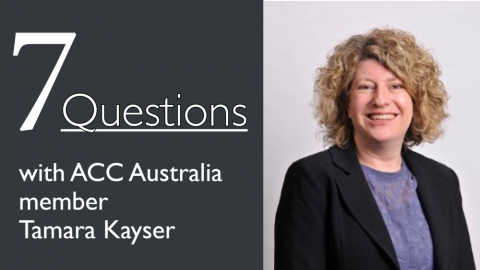7 Questions with ACC Australia member, Tamara Kayser - Group General Counsel, Incitec Pivot Limited
1. Tell us about your current role
I have been at Incitec Pivot for nearly ten years and have been Group General Counsel for four years. The legal team comprises five people in Australia, and we also have two lawyers in the US and one in Turkey.
Incitec Pivot manufactures and distributes explosives, industrial chemicals and fertilisers, with operations in countries including Australia, the US, Canada, Mexico, Indonesia, Turkey and Chile, as well as various joint ventures including in South Africa and Hong Kong. I work closely with members of the Executive Team and people in in the risk, strategy, finance, HSE, tax and HR business units. IPL is listed on the ASK so recently I have been immersed in work relating to our annual results and AGM.
2. What advice would you give in-house counsel in building relationships within their organisations?
Understanding the business, including what people are trying to achieve and where the risks and challenges lie, is critical to developing strong relationships. Having that understanding can be key to being able to provide useful and relevant advice and guidance.
3. What are some of the factors that led you to pursue an in-house legal role?
I started at IPL on secondment from a major law firm and during my secondment IPL acquired its Dyno Nobel explosives business, doubling the size of the company, so it was an exciting and challenging time. I loved the breadth of exposure to multiple facets of the business, and being involved and invested in commercial decisions.
4. What is the one thing a law degree doesn't teach you about being a lawyer?
To be successful as a lawyer in-house, you need to engage with people across a variety of functions, weigh up disparate facts and circumstances and balance legal positions with commercial and strategic imperatives. My work very rarely involves simply advising on a technical legal position, so some skills needed in practise are quite different from what a law degree teaches. But through their degrees, lawyers also develop a general ability to distil information and express it logically and clearly.
5. What are the biggest changes you’ve witnessed across the legal sector since you joined the profession?
When I started working as a lawyer nearly 25 years ago, email didn’t exist and mobile phones were rare (and gigantic). Technological changes have speeded things up and led to a vastly increased volume of information being produced. The legal market is much more competitive, with more firms and many international tie-ups that didn’t previously exist. Also, the role and perception of in-house lawyers has changed so that they are now often seen as key stakeholders in business decisions, and not simply as legal advisers.
6. What is the best piece of advice you would offer a lawyer that’s new to the in-house sector?
It’s really important to stand your ground – it is critical to listen to others and not be didactic, but don’t be intimidated into changing your view to suit others, and don’t compromise your principles. You won’t always be right and your advice won’t always be taken, but develop an informed view and state your position.
7. Finish this sentence: If I wasn’t a lawyer I’d be… a frustrated accountant.
Posted 28/11/17


